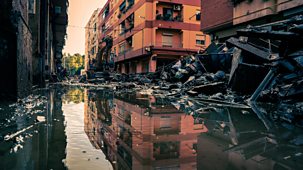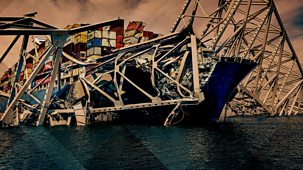
Why Planes Crash
December 2024. A passenger plane landing at Muan International Airport in South Korea skids off the runway and explodes. 179 people lose their lives in the worst aviation disaster on South Korean soil. This is the start of an extraordinary period in aviation.\n\nFour weeks later in America, a military helicopter collides with a passenger plane above Washington DC, killing 67 people. It’s the first major commercial plane crash in America in nearly 16 years.\n\nIn February 2025, a commuter jet crashes upon touchdown in Toronto and rolls onto its roof. Remarkably, all passengers and crew escape with their lives. Then, on 12 June, an Air India plane bound for London crashes just seconds after take-off. Only one passenger survives. 260 people are killed.\n \nThis year, the total number of air travellers is forecast to hit a record 4.9 billion. Can lessons be learned from this spate of aviation disasters?\n\nFeaturing interviews with eyewitnesses and bereaved relatives, shocking footage and forensic analysis from accident investigators and aviation experts, this documentary investigates what went wrong.\n\nIn South Korea, 24-year-old Geun-woo Park describes the moment he received a text message from his mother, who was on board Jeju Air Flight 2216. She wrote that a bird was 'stuck in the engine'. He thought she was joking. Minutes later, the plane made an emergency landing at Muan International Airport before skidding off the runway and exploding. Investigators find the remains of birds in both of the plane’s engines.\n\nA double-engine bird strike is very rare but not without precedent. In 2009, a plane taking off from New York’s LaGuardia Airport hit a flock of geese and lost power to both of its engines. The captain was 'Sully' Sullenberger. He relives that fateful day and explains how he managed to glide his stricken aircraft to land safely on the Hudson River, saving the lives of all 155 people on board.\n\nAfter every bird-aircraft collision in America, biological samples are sent to the Feather Identification Laboratory at the Smithsonian Museum in Washington DC. Dr Carla Dove explains why her team’s work is crucial in trying to prevent future bird strikes. She also reveals that bird-aircraft collisions are on the increase.\n\nMeanwhile, aviation safety expert and former commercial pilot Professor Bohun Kwon draws attention to a concrete barrier at the end of the runway. If this structure had not been there, could more people have survived the crash?\n\nIn Washington DC, we meet Tim Lilley. Tim’s 28-year-old son Sam was the first officer on American Airlines Flight 5342, which collided with a US army helicopter. Tim is also a professional pilot. For 20 years, he flew Blackhawk US military helicopters - just like the one involved in the crash which killed his son. They had discussed in detail the complex flight paths around Ronald Reagan Washington National Airport. Tim explains that he never really thought to warn him about the helicopters, because it's the helicopters’ job to stay away from the airplanes and not vice versa.\n\nWe uncover evidence of fatal design flaws in the helicopter routes over Washington DC and reveal shocking data that, in the last three years alone, there have been more than 15,000 incidents of aircraft and helicopters coming within 120 metres of one other in the airspace over Ronald Reagan Washington National Airport.\n\nIn Minnesota, we meet Hannah Krebs, a passenger on board Delta Connection Flight 4819. Hannah’s plane overturned in a fireball as it landed at Toronto Pearson Airport. How did all 80 passengers and crew escape with their lives?\n\nJust a few months later, the deadliest aviation disaster in a decade occurs in Ahmedabad, India. On 12 June 2025, Air India Flight 171 takes off, bound for Gatwick. The plane is airborne for just 32 seconds before crashing into a medical college. Nineteen people on the ground and 241 people on board the aircraft, including 52 British nationals, are killed. Incredibly, one passenger survives. Vishwash Kumar Ramesh was seated next to an exit row and managed to climb out of the wreckage. A preliminary report released by accident investigators reveals that two fuel switches in the cockpit 'transitioned' from 'run' to 'cut-off'. An audio recording from the cockpit captured one of the pilots asking the other why he 'cut off'. Is this evidence that one of the pilots starved the engines of fuel, either accidentally or intentionally? We meet Captain Kishore Chinta, a former investigator with India’s Aircraft Accident Investigation Bureau. He believes the possibility of a software or electrical malfunction in the plane must not be ruled out. \n\nWhat connects this spate of aviation disasters? As more and more people take to the skies, Captain Sully says that we must understand that, given enough time, given enough flight operations, eventually whatever can happen will happen. We must be prepared not only for the predictable but for the unimaginable.
Source: BBC 1
Most recent episodes of Why...?
Why...?
Why Planes Crash
December 2024. A passenger plane landing at Muan International Airport in South Korea skids off the runway and explodes. 179 people lose their lives in the worst aviation disast ...
16-11-2025
BBC 1
Why...?
Why Cities Flood: Spain's Deadly Disaster
On 29 October 2024, a powerful storm hit the area around Valencia in Spain. Torrential rain fell on the hills to the west of the city, causing devastating flash floods. Across t ...
03-07-2025
BBC 1
Why...?
Why Bridges Collapse: The Baltimore Disaster
On 26 March 2024, a 100,000-tonne container ship, the MV Dali, crashed into the Francis Scott Key Bridge in Baltimore. Tragically, six people lost their lives, the Port of Balti ...
01-04-2025
BBC 1
Why...?
Why Trains Crash
On the evening of 2 June 2023, a devastating crash involving three trains killed nearly 300 people and injured more than 800 at Bahanaga Bazar station in India’s eastern O ...
02-08-2024
BBC 1
Most popular episodes of Why...?
Why...?
Why Bridges Collapse: The Baltimore Disaster
On 26 March 2024, a 100,000-tonne container ship, the MV Dali, crashed into the Francis Scott Key Bridge in Baltimore. Tragically, six people lost their lives, the Port of Balti ...
01-04-2025
BBC 1
Why...?
Why Trains Crash
On the evening of 2 June 2023, a devastating crash involving three trains killed nearly 300 people and injured more than 800 at Bahanaga Bazar station in India’s eastern O ...
02-08-2024
BBC 1
Why...?
Why Planes Crash
December 2024. A passenger plane landing at Muan International Airport in South Korea skids off the runway and explodes. 179 people lose their lives in the worst aviation disast ...
16-11-2025
BBC 1
Why...?
Why Cities Flood: Spain's Deadly Disaster
On 29 October 2024, a powerful storm hit the area around Valencia in Spain. Torrential rain fell on the hills to the west of the city, causing devastating flash floods. Across t ...
03-07-2025
BBC 1




